Next-IO™ Anti-A3AR Therapeutic Monoclonal Antibody Program
About This Program
This program aims to develop anti-A3AR therapeutic monoclonal antibodies for immuno-oncology.
Targeting the A3 adenosine receptor (A3AR) can have different effects on normal and cancer cells. Adenosine has the effect of inhibiting the growth of many tumor cell types, including colon, prostate cancer, and lymphoma. In addition, peripheral blood mononuclear cells exposed to adenosine induce the production of granulocyte colony-stimulating factor (G-CSF). When orally administered in mice, agonists inhibit the growth of melanoma, colon cancer, and prostate cancer, while inducing the production of G-CSF to exert myeloprotective effects. Therefore, targeting A3AR is a promising class of novel cancer therapeutic programs.
A3AR
As a G protein-coupled receptor, A3AR has been found to be overexpressed in a variety of cancer types. In past decades of research, it has been reported to have cardioprotective functions, inhibition of neutrophil degranulation, neuroprotective, and neurodegenerative effects. In addition, A3AR has also been reported to be associated with cell death and cell proliferation.
-
A3AR is overexpressed in cancer and is considered a tumor diagnosis/prognostic marker.
-
A3AR stimulation inhibits tumor growth by modulating the Wnt pathway.
-
A3AR has a dual nature in cancer. It can both promote cell proliferation and survival, and trigger cytostatic and apoptosis pathways.
Highlights of A3AR for Cancer Immunotherapy:
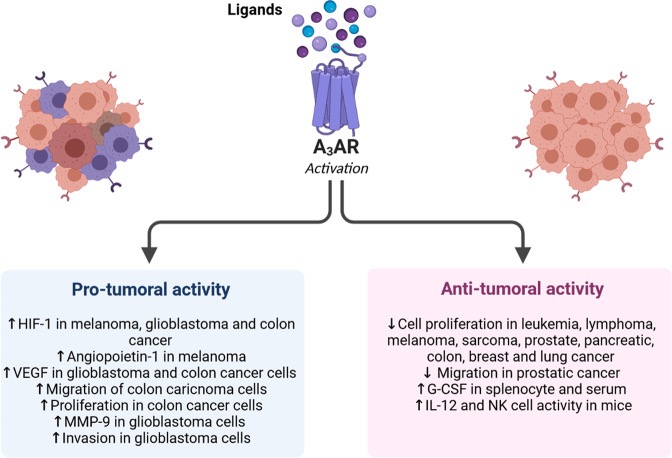 Fig.1 Protumor and antitumor activity of A3 adenosine receptors.1,3
Fig.1 Protumor and antitumor activity of A3 adenosine receptors.1,3
A3AR in Cancer Studies
Here are some figures from published articles about A3AR as a target for cancer immunotherapy.
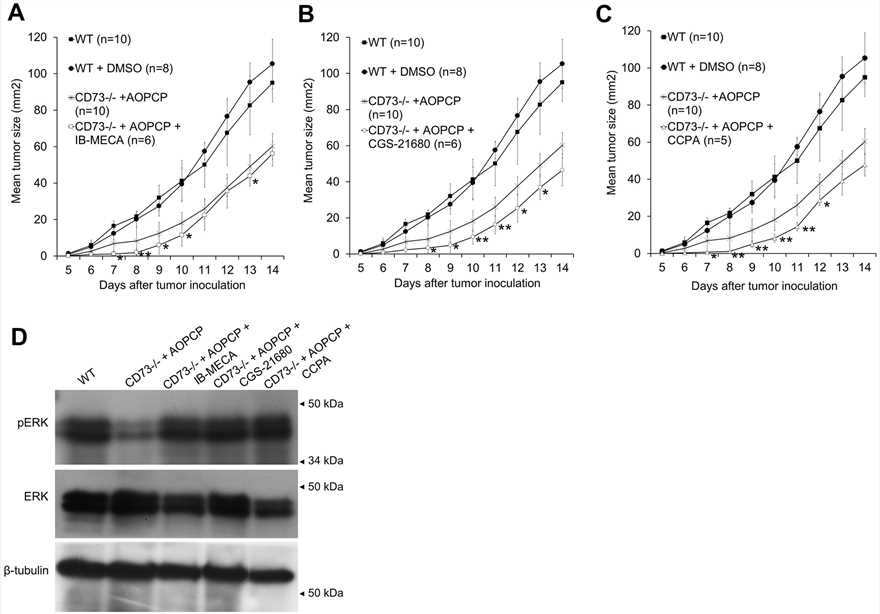 Fig.2 A3 adenosine receptors regulate intratumoral vascular density and angiogenesis.2,3
Fig.2 A3 adenosine receptors regulate intratumoral vascular density and angiogenesis.2,3
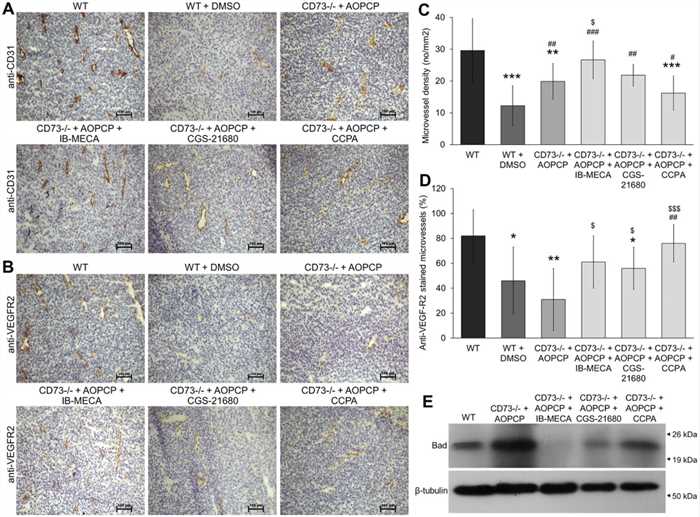 Fig.3 The A3 adenosine receptor regulates the expression of major pro-angiogenic factors in B16F10 melanoma.2,3
Fig.3 The A3 adenosine receptor regulates the expression of major pro-angiogenic factors in B16F10 melanoma.2,3
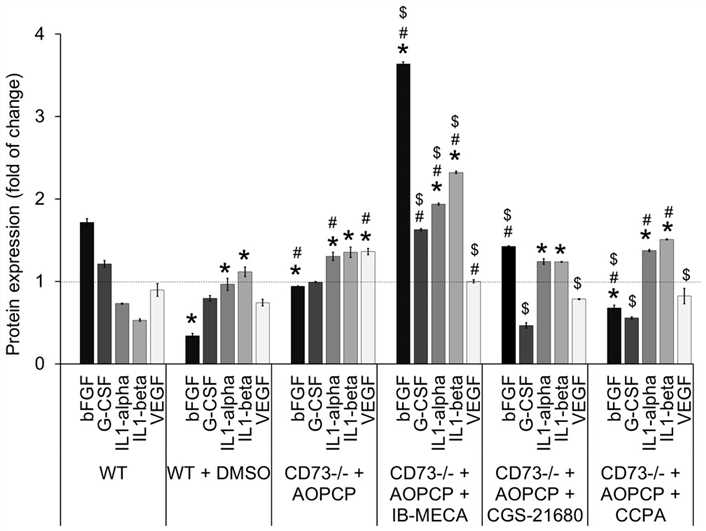 Fig.4 Stimulation of A3 adenosine receptors increases tumor infiltration of macrophages.2,3
Fig.4 Stimulation of A3 adenosine receptors increases tumor infiltration of macrophages.2,3
Clinical Trials Under Progress
In conclusion, A3AR and its ligands are key players in cancer initiation/progression. There is in vitro / in vivo evidence that A3AR is overexpressed in a variety of cancer types such as breast cancer, colon cancer, glioblastoma/glioma, MPM, and lymphoma. Therefore, A3AR has the potential to be used as a tumor diagnostic/prognostic marker and a target for anti-cancer therapy. A3AR has emerged as an attractive target for anti-tumor therapy, and some of these agonists are currently being tested in clinical trials with encouraging results.
There have been many studies investigating the structure and function of A3AR, but due to its dual role in cancer, further research on the dual nature of A3AR activation and in vitro / in vivo studies of the mechanism of A3AR cancer are needed. These data suggest that A3AR can help improve cancer diagnosis, prognostic management of cancer patients, and the development of new therapies.
Program Plan
Creative Biolabs has extensive experience and expertise in the development of therapeutic antibody programs. For the Anti-A3AR Therapeutic Monoclonal Antibody Program, we commit to providing the final complete program to our customers within 1.5 years prior to entering the IND phase.
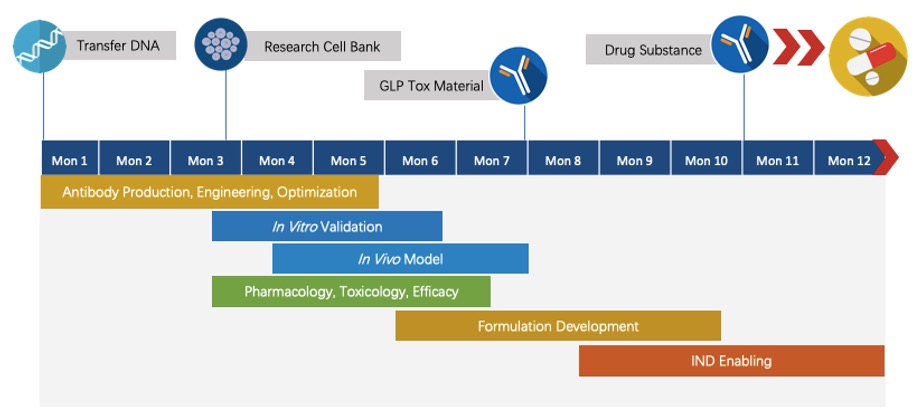
Cooperation
Creative Biolabs is interested in finding potential partners to develop the anti-A3AR therapeutic monoclonal antibody program. Our scientists have many years of experience in the field of antibody development and want to pool more knowledge and achieve interesting and co-developing partners. Creative Biolabs hopes to help both parties move on to the next stages of IND and clinical trials through the partnership.
If you are interested in our anti-A3AR therapeutic monoclonal antibody program, please contact us now.
References
-
Mazziotta, Chiara, et al. "Cancer biology and molecular genetics of A3 adenosine receptor." Oncogene 41.3 (2022): 301-308.
-
Koszałka, Patrycja, et al. "Specific activation of A3, A2A and A1 adenosine receptors in CD73-knockout mice affects B16F10 melanoma growth, neovascularization, angiogenesis and macrophage infiltration." PloS one 11.3 (2016): e0151420.
-
Distributed under Open Access license CC BY 4.0, without modification.
For Research Use Only | Not For Clinical Use


 Fig.1 Protumor and antitumor activity of A3 adenosine receptors.1,3
Fig.1 Protumor and antitumor activity of A3 adenosine receptors.1,3
 Fig.2 A3 adenosine receptors regulate intratumoral vascular density and angiogenesis.2,3
Fig.2 A3 adenosine receptors regulate intratumoral vascular density and angiogenesis.2,3
 Fig.3 The A3 adenosine receptor regulates the expression of major pro-angiogenic factors in B16F10 melanoma.2,3
Fig.3 The A3 adenosine receptor regulates the expression of major pro-angiogenic factors in B16F10 melanoma.2,3
 Fig.4 Stimulation of A3 adenosine receptors increases tumor infiltration of macrophages.2,3
Fig.4 Stimulation of A3 adenosine receptors increases tumor infiltration of macrophages.2,3

 Download our brochure
Download our brochure